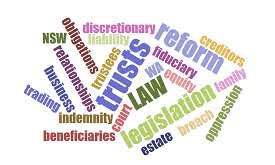Trust Beneficiaries - Liability and Oppression
19 Jun 2018

Law Reform in New South Wales
In NSW, the Attorney General asked the Law Reform Commission to review and report on 2 aspects of the law relating to beneficiaries of trusts:
-
The liability of beneficiaries, as beneficiaries, to indemnify trustees or creditors when trustees fail to satisfy obligations of the trust; and
-
Whether oppression remedies available under company law should be extended to beneficiaries of trading trusts.
The Commission’s report was transmitted to the NSW Attorney General on 2 May 2018.
Trusts have long been used as a means by which assets are legally held by one person or entity for the benefit of others.
There are many types of trust relationships including discretionary family trusts and unit trusts, and an executor of a deceased estate is trustee of the estate assets.
A trustee is in a fiduciary relationship in relation to the property held and accountable for their actions to the beneficiaries and to the courts for their conduct.
As a general rule, trustees acting properly are entitled to be indemnified for reasonable expenses incurred in acting as trustee. It would be wrong to expect a beneficiary to indemnify a trustee who has caused a liability or failed to satisfy trust obligations.
Some trusts are used for operating a business. At times holders of a small number of units in a unit trust may be oppressed by holders of a greater interest. With discretionary trusts, a trustee may also effectively oppress a beneficiary by providing them little or no benefit.
Submissions received by the Commission included that:
-
beneficiaries in a trust should have no liability to indemnify trustee or creditors of the trust, or at least there should be limits to that liability such as to any unpaid balance of their units;
-
there ought to be an oppression remedy, and that remedy should extend to discretionary trusts;
-
the reforms should be made through amendments to the Trustees Act 1925 (NSW), which would provide the courts with a broad and flexible range of remedies, although limitations on oppression similar to those in the Corporations Act and impacting upon superannuation for example, would need to be made by amendment to Commonwealth legislation;
-
the need for wider trust law reform should not be delayed by introduction of legislation to address the above issues; and
-
despite all of the above, no reform is actually required but the issue relating to oppression remedies in this context gives rise to large legal and philosophical issues.
A trust deed, if carefully drafted, and existing legal and equitable principles can address the above issues.
The Position in Western Australia
So, is reform required in WA? While the Trustees Act (WA) 1962 has not been amended for some years, it contains provisions:
-
clarifying when the trustee is not liable for breach of trust; or where the trustee is liable, but that liability is limited; and factors to be considered by the Supreme Court as to when there has been a breach of trust for which the trustee is liable for breach of trust. If the trustee is personally liable, the Court has a discretion to relieve the trustee from liability if appropriate.
-
by which a trustee may, if the Court considers it just, to permit the trustee to be indemnified if the breach of trust occurred at the instigation of, request of or with the written consent of a beneficiary.
-
in relation to investments, for rules and principles of law or equity that impose a duty on a trustee exercising a power of investment, including a duty to act in the best interest of all present and future beneficiaries and a duty to act impartially towards beneficiaries and different classes of beneficiaries, to continue to apply;
-
in relation to investments, for rules and principles of law and equity that relate to a provision in an instrument creating a trust that purports to exempt, limit the liability of, or indemnify the trustee in respect of a breach of trust, to continue to apply.
-
by which the Court has power to hear a range of applications for review of the trustee’s conduct, or for the trustee to obtain directions as to an appropriate course of action to protect themselves against liability.
In WA the liability of beneficiaries, if not sufficiently clear under the trust deed, may be clarified by the Court and any concerns of oppressive conduct or breach of duties by a trustee may be the subject of application to the Supreme Court.
Should it be necessary as either a beneficiary, trustee or creditor to obtain advice or representation in relation to these issues, or to ensure that your trust deed addresses these issues, please contact Mark Fatharly or Mike Frampton on +61 8 9388 3100.
Download PDF
Back To Articles